牛津译林版英语七下7 Unit7复习教学案
牛津译林版七年级下册Unit 7《Abilities》(Period 7)教学设计

牛津译林版七年级下册Unit 7《Abilities》(Period 7)教学设计一. 教材分析牛津译林版七年级下册Unit 7《Abilities》(Period 7)主要讲述了一个关于寻找丢失物品的故事。
本节课的主要内容包括:词汇(如hospital, police等),语法(一般过去时态),以及听力、口语、阅读和写作技能的训练。
通过本节课的学习,学生能够掌握相关词汇和句型,并运用一般过去时态描述过去发生的事情。
二. 学情分析七年级的学生已经掌握了一些基本的英语语法和词汇,但对一般过去时态的运用还不够熟练。
学生在听力、口语、阅读和写作方面有了一定的基础,但还需要进一步的训练和提高。
此外,学生对寻找丢失物品的情境感兴趣,有利于激发他们的学习积极性。
三. 教学目标1.知识目标:学生能够掌握本节课的生词和短语,理解并运用一般过去时态描述过去发生的事情。
2.能力目标:学生能够在实际情境中运用所学知识进行交流,提高听、说、读、写的能力。
3.情感目标:学生能够培养对英语学习的兴趣,增强团队合作意识。
四. 教学重难点1.重点:学生掌握一般过去时态的运用。
2.难点:学生能够在实际情境中灵活运用一般过去时态进行交流。
五. 教学方法1.情境教学法:通过设置寻找丢失物品的情境,让学生在实际语境中学习和运用英语。
2.任务型教学法:引导学生参与各种小组活动,提高学生的合作能力和实际应用能力。
3.交际法:鼓励学生大胆开口,进行真实的交流。
六. 教学准备1.教材:牛津译林版七年级下册Unit 7《Abilities》(Period 7)2.多媒体设备:电脑、投影仪、音响等3.教学课件:包括图片、音频、视频等4.学生活动材料:小组活动记录表、听力材料等七. 教学过程1.导入(5分钟)利用图片和问题引导学生回顾以前学过的关于寻找丢失物品的情境,激发学生的兴趣。
例如:“你们还记得我们以前学过的小故事吗?今天我们将学习一个新的故事,故事中会发生什么有趣的事情呢?”2.呈现(10分钟)展示课文图片,引导学生观察并回答问题。
2023年牛津译林版七年级英语下册Unit7 教学设计
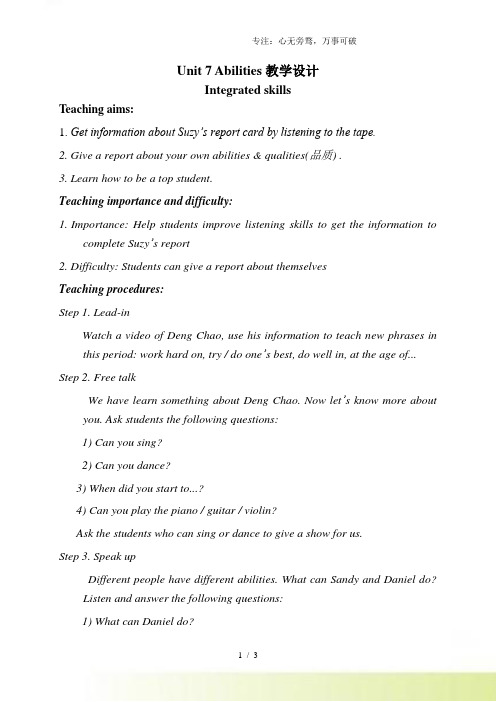
Unit 7 Abilities教学设计Integrated skillsTeaching aims:1. Get information about Suzy’s report card by listening to the tape.2. Give a report about your own abilities & qualities(品质) .3. Learn how to be a top student.Teaching importance and difficulty:1.Importance: Help students improve listening skills to get the information tocomplete Suzy’s report2. Difficulty: Students can give a report about themselvesTeaching procedures:Step 1. Lead-inWatch a video of Deng Chao, use his information to teach new phrases in this period: work hard on, try / do one’s best, do well in, at the age of... Step 2. Free talkWe have learn something about Deng Chao. Now let’s know more about you. Ask students the following questions:1) Can you sing?2) Can you dance?3) When did you start to...?4) Can you play the piano / guitar / violin?Ask the students who can sing or dance to give a show for us.Step 3. Speak upDifferent people have different abilities. What can Sandy and Daniel do?Listen and answer the following questions:1) What can Daniel do?2) When did he start to do it?3) What can Sandy do?4) When did she start to do it?Boys and girls read the dialogue in role-play. Then make their own dialogues with the help of pictures and patterns.Step 4. Listen and write the correct lettersAs we know, Deng Chao is weak in Maths. What about Suzy? Before listening, give students two tips about listening skills to help students to get the answers.Step 5. Listen and complete the report cardAccording to Part A1, finish the part of Suzy’s study first. Then listen and finish the rest parts. Before listening, give another tip to help students. Step 6. Make a new pro yourself and report it.First, use the information to make a pro Suzy. Then finish the following Name: Class: Grade:Study Good at:Weak in:Music:Sports:Quality(品质):At last, use the phrases we have learnt this period and the sentence patterns to give a report about themselves.The following sentence patterns may help you:I’m ... I’m a student in Class... , Grade 7I do well in…, because…But I am weak in…, because…Every subject is important. I will work hard on…and try my best to learn…I like music…I also lik e sports…I am…All my teachers and classmates like me very much.Step 7. Discussion: How to be a top student?Work in groups of four and discuss what can make you be a top student. Students A & B say something, student C writes it down and Student D reports it. Make sure each student has something to do.Step 8. HomeworkFinish a report about yourself.You can talk about your study, qualities, school life and future plan (未来计划).。
2023年牛津译林版七年级英语下册Unit7复习教案
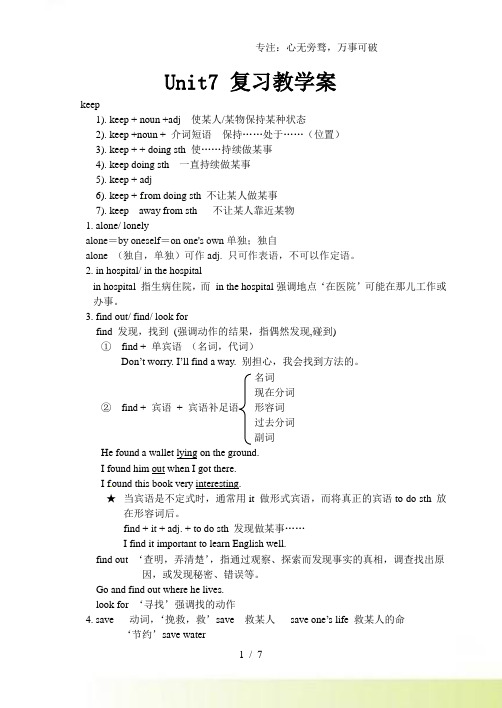
Unit7 复习教学案keep1). keep + noun +adj 使某人/某物保持某种状态2). keep +noun + 介词短语保持……处于……(位置)3). keep + + doing sth 使……持续做某事4). keep doing sth 一直持续做某事5). keep + adj6). keep + f rom doing sth 不让某人做某事7). keep away from sth 不让某人靠近某物1.alone/ lonelyalone=by oneself=on one's own单独;独自alone (独自,单独)可作adj. 只可作表语,不可以作定语。
2.in hospital/ in the hospitalin hospital 指生病住院,而in the hospital强调地点‘在医院’可能在那儿工作或办事。
3.find out/ find/ look forfind 发现,找到(强调动作的结果,指偶然发现,碰到)①find + 单宾语(名词,代词)Don’t worry. I’ll find a way. 别担心,我会找到方法的。
名词现在分词②find + 宾语+ 宾语补足语形容词过去分词副词He found a wallet lying on the ground.I found him out when I got there.I f ound this book very interesting.★当宾语是不定式时,通常用it 做形式宾语,而将真正的宾语to do sth 放在形容词后。
find + it + adj. + to do sth 发现做某事……I find it important to learn English well.find out ‘查明,弄清楚’,指通过观察、探索而发现事实的真相,调查找出原因,或发现秘密、错误等。
牛津译林版英语七下Unit 7《Abilities》(Integrated skills)教学设计

牛津译林版英语七下Unit 7《Abilities》(Integrated skills)教学设计一. 教材分析牛津译林版英语七下Unit 7《Abilities》(Integrated skills)主要讲述了关于能力的话题,包括如何描述一个人的能力和如何根据能力选择合适的工作。
本单元通过一个故事,让学生学会如何运用所学的语言知识去描述一个人的能力和特点,以及如何根据这些能力去选择合适的工作。
二. 学情分析学生在学习本单元之前,已经掌握了基本的英语语法和词汇,具备一定的听说读写能力。
但是,对于如何运用英语描述一个人的能力和特点,以及如何根据能力选择工作,可能还存在一定的困难。
因此,在教学过程中,需要注重培养学生的语言运用能力和思维能力。
三. 教学目标1.能够听懂、会说、会读、会写本单元的生词和短语。
2.能够运用所学的语言知识描述一个人的能力和特点。
3.能够根据一个人的能力和特点,选择合适的工作。
4.培养学生的语言运用能力和思维能力。
四. 教学重难点1.能够正确运用英语描述一个人的能力和特点。
2.能够根据一个人的能力和特点,选择合适的工作。
五. 教学方法1.交际法:通过模拟真实情境,让学生在实际交流中运用所学知识。
2.任务型教学法:通过完成各种任务,让学生在实践中学习和应用所学知识。
3.合作学习法:通过小组合作,让学生相互交流、相互学习,提高学习效果。
六. 教学准备1.PPT课件:制作包含本单元重点内容的PPT课件。
2.教材:准备《牛津译林版英语七下》教材。
3.相关图片和视频:准备与本单元主题相关的图片和视频。
4.练习题:准备相关练习题,用于巩固所学知识。
七. 教学过程1.导入(5分钟)利用图片和视频,引导学生谈论关于能力的话题,激发学生的学习兴趣。
2.呈现(10分钟)通过PPT课件,呈现本课的生词和短语,让学生听读并跟读。
3.操练(15分钟)设计一些简单的口语练习,让学生模仿和操练本课的生词和短语。
Unit 7 复习课时教案牛津译林版七年级英语下册
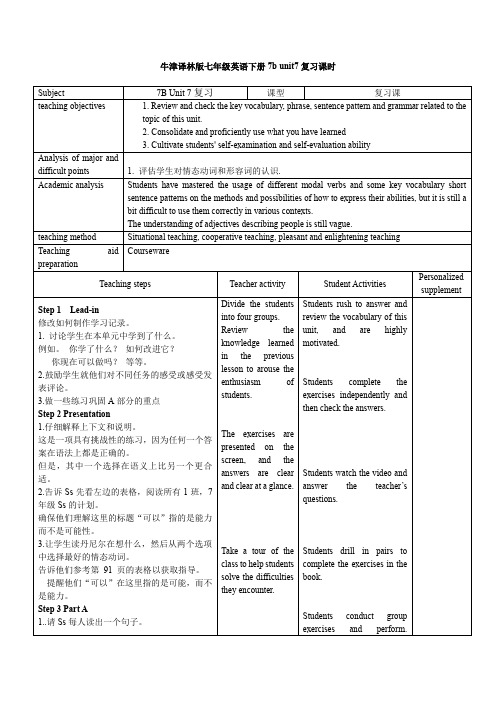
Academic analysis
Students have mastered the usage of different modal verbs and some key vocabulary short sentence patterns on the methods and possibilities of how to express their abilities, but it is still a bit difficult to use them correctly in various contexts.
Take a tour of the class to help students solve the difficulties they encounter.
Group students to read the provided articles so that students can know how to help others
Introduce students' goals that need to help others through questions. Tell students to help others is to help themselves.
Let students complete it independently, but they can choose questions to inspire their emotions of striving for excellence. Review the key points of this unit. Check whether they have mastered it.
牛津译林版七年级英语下册第七单元unit7教学设计

牛津译林版七年级英语下册第七单元unit7教学设计一、教学目标1.能够听懂、会说、会读单词及短语:go straight, turn left/right, cross the street, traffic lights, on the left/right, next to。
2.能够用所学语言表述自己的路线和问别人如何到达某个地方。
3.了解不同国家和地区交通规则的差异。
二、教学重点1.熟练掌握新单词。
2.会用英语描述自己的路线和问别人如何到达某个地方。
三、教学难点1.能够用英语表达具体的路线指引。
2.能够了解不同国家和地区交通规则的差异。
四、教学方法1.合作学习法,让学生在讨论和合作中进行互动交流,以提高英语口语表达能力。
2.任务型教学法,通过实际操作任务让学生更深入地理解所学知识。
五、教学过程Step 1 Revision教师领读上一单元的重点词汇和短语,以复习上一单元所学内容。
Step 2 Lead-in1.使用图片和视频引导学生感受不同国家和地区的交通规则,让学生尽可能地描述这些规则以及它们的不同部分。
2.请一名学生上来,向全班描述如何到达一所知名景区或商场,引导其他学生询问,并共同制定正确路线指引。
Step 3 Presentation1.教授本单元新单词。
2.将学生分为小组,让每个小组用学过的单词和短语描述如何去一个陌生地方,并在分享的时候结合地图互相指引路线。
Step 4 Practice1.让学生在组内进行任务配对,每队选择一些规定的路线进行对话,其中一个学生描述路线,另一名学生根据描述找到目的地。
2.教师出示不同国家和地区的不同交通标志,让学生学习、研究这些标志,以便了解不同的交通规则。
Step 5 Production1.由教师挑选一些同学进行短篇演讲,介绍自己所在城市的交通规则,以及充分运用所学的短语指引路线。
2.组织学生分组口语竞赛,每个小组的学生可以讨论、形成指引并尝试使用更多的短语和词汇描述他们的路线。
牛津译林版英语七下Unit 7《Abilities》教学设计3
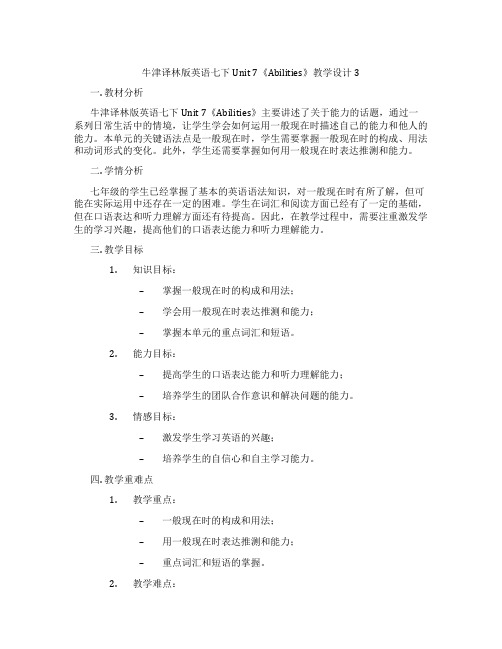
牛津译林版英语七下Unit 7《Abilities》教学设计3一. 教材分析牛津译林版英语七下Unit 7《Abilities》主要讲述了关于能力的话题,通过一系列日常生活中的情境,让学生学会如何运用一般现在时描述自己的能力和他人的能力。
本单元的关键语法点是一般现在时,学生需要掌握一般现在时的构成、用法和动词形式的变化。
此外,学生还需要掌握如何用一般现在时表达推测和能力。
二. 学情分析七年级的学生已经掌握了基本的英语语法知识,对一般现在时有所了解,但可能在实际运用中还存在一定的困难。
学生在词汇和阅读方面已经有了一定的基础,但在口语表达和听力理解方面还有待提高。
因此,在教学过程中,需要注重激发学生的学习兴趣,提高他们的口语表达能力和听力理解能力。
三. 教学目标1.知识目标:–掌握一般现在时的构成和用法;–学会用一般现在时表达推测和能力;–掌握本单元的重点词汇和短语。
2.能力目标:–提高学生的口语表达能力和听力理解能力;–培养学生的团队合作意识和解决问题的能力。
3.情感目标:–激发学生学习英语的兴趣;–培养学生的自信心和自主学习能力。
四. 教学重难点1.教学重点:–一般现在时的构成和用法;–用一般现在时表达推测和能力;–重点词汇和短语的掌握。
2.教学难点:–一般现在时的运用和实际语境中的运用;–动词形式的变化和运用。
五. 教学方法1.情境教学法:通过设定各种日常生活中的情境,让学生在实际语境中学习和运用英语。
2.交际教学法:通过小组讨论、角色扮演等活动,让学生在实际交流中提高口语表达能力和听力理解能力。
3.任务型教学法:通过完成各种任务,让学生在实践中学习和运用英语。
4.激励评价法:注重鼓励和表扬学生,激发他们的学习兴趣和自信心。
六. 教学准备1.教材:牛津译林版英语七下Unit 7《Abilities》课本和练习册。
2.多媒体设备:电脑、投影仪、音响等。
3.教学素材:相关图片、视频、录音等。
4.教学卡片:重点词汇和短语的卡片。
牛津译林版七年级下册Unit 7《Abilities》复习教学设计

牛津译林版七年级下册Unit 7《Abilities》复习教学设计一. 教材分析牛津译林版七年级下册Unit 7《Abilities》的主题是能力,涉及到日常生活中的一些基本能力,如游泳、唱歌、跳舞等。
本单元的主要语言知识点是情态动词can的用法,以及与之相关的问答句型。
此外,本单元还包括一些与能力相关的词汇和短语,如swim, sing, dance等。
二. 学情分析七年级的学生已经初步掌握了英语的基础知识,对于情态动词有一定的了解,但还需在实际语境中进行巩固和应用。
学生对于新词汇和短语的掌握程度不同,因此需要在教学中进行有针对性的辅导。
三. 教学目标1.能够正确使用情态动词can询问和回答他人的能力。
2.能够熟练运用本单元的词汇和短语进行日常交流。
3.提高学生的团队合作能力和交际能力。
四. 教学重难点1.情态动词can的用法及其问答句型。
2.词汇和短语的掌握和运用。
五. 教学方法采用任务型教学法,通过设定各种实际情境,让学生在实践中学习和运用语言知识。
同时,运用小组合作学习法,鼓励学生相互交流、讨论,提高学生的团队合作能力和交际能力。
六. 教学准备1.PPT课件2.教学录音机和磁带3.相关图片和卡片4.练习册和作业本七. 教学过程1.导入(5分钟)通过播放一段英语歌曲,引导学生关注歌曲中出现的能力词汇,如swim, sing, dance等。
然后询问学生:“Can you swim? Can you sing? Can you dance?”,引导学生用Yes/No回答。
2.呈现(10分钟)利用PPT课件,展示本节课的主要内容,包括情态动词can的用法及其问答句型。
同时,呈现本节课的词汇和短语,如swim, sing, dance等。
3.操练(10分钟)将学生分成小组,进行角色扮演练习。
每组选出一个主题,如体育、艺术、烹饪等,用本节课学到的词汇和短语进行描述。
其他小组成员负责提问,使用情态动词can进行询问。
牛津译林版英语七下7 Unit7复习教学案
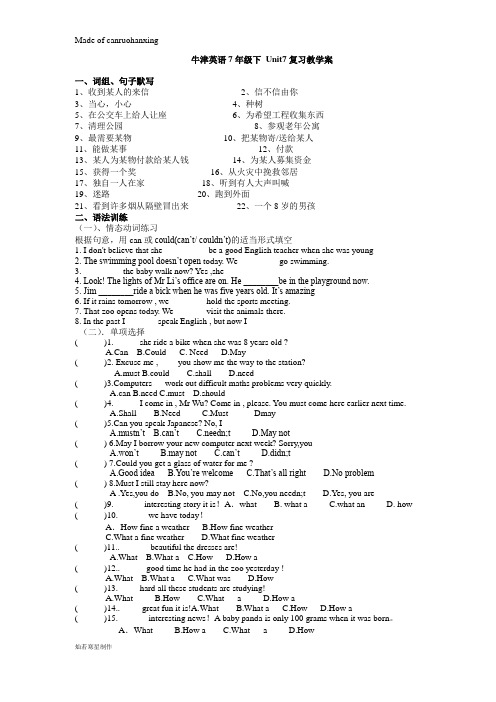
牛津英语7年级下Unit7复习教学案一、词组、句子默写1、收到某人的来信2、信不信由你3、当心,小心4、种树5、在公交车上给人让座6、为希望工程收集东西7、清理公园8、参观老年公寓9、最需要某物10、把某物寄/送给某人11、能做某事12、付款13、某人为某物付款给某人钱14、为某人募集资金15、获得一个奖16、从火灾中挽救邻居17、独自一人在家18、听到有人大声叫喊19、迷路20、跑到外面21、看到许多烟从隔壁冒出来22、一个8岁的男孩二、语法训练(一)、情态动词练习根据句意,用can或could(can’t/ couldn’t)的适当形式填空1. I don't believe that she __________be a good English teacher when she was young2. The swimming pool doesn’t open today. We _________go swimming.3. _________the baby walk now? Yes ,she _________4. Look! The lights of Mr Li’s office are on. He ________be in the playground now.5. Jim ________ride a bick when he was five years old. It’s amazing6. If it rains tomorrow , we ________hold the sports meeting.7. That zoo opens today. We _______visit the animals there.8. In the past I _______speak English , but now I _______(二).单项选择( )1.______she ride a bike when she was 8 years old ?A.CanB.CouldC. NeedD.May( )2. Excuse me , ____you show me the way to the station?A.mustB.couldC.shallD.need( )puters___work out difficult maths problems very quickly.A.canB.needC.mustD.should( )4.______I come in , Mr Wu? Come in , please. You must come here earlier next time.A.ShallB.NeedC.Must Dmay( )5.Can you speak Japanese? No, I ________A.mustn’tB.can’tC.needn;tD.May not( ) 6.May I borrow your new computer next week? Sorry,you_______A.won’tB.may notC.can’tD.didn;t( ) 7.Could you get a glass of water for me ? __________A.Good ideaB.You’re welcomeC.That’s all rightD.No problem( ) 8.Must I still stay here now?______A .Yes,you do B.No, you may not C.No,you needn;t D.Yes, you are( )9._______interesting story it is!A.what B. what a C.what an D. how ( )10._______we have today!A.How fine a weather B.How fine weatherC.What a fine weatherD.What fine weather( )11.._______beautiful the dresses are!A.WhatB.What aC.HowD.How a( )12..______good time he had in the zoo yesterday !A.WhatB.What aC.What wasD.How( )13._____hard all these students are studying!A.WhatB.HowC.What aD.How a( )14.._____great fun it is!A.What B.What a C.How D.How a( )15._______interesting news!A baby panda is only 100 grams when it was born。
牛津译林版英语七下Unit 7《Abilities》教学设计4
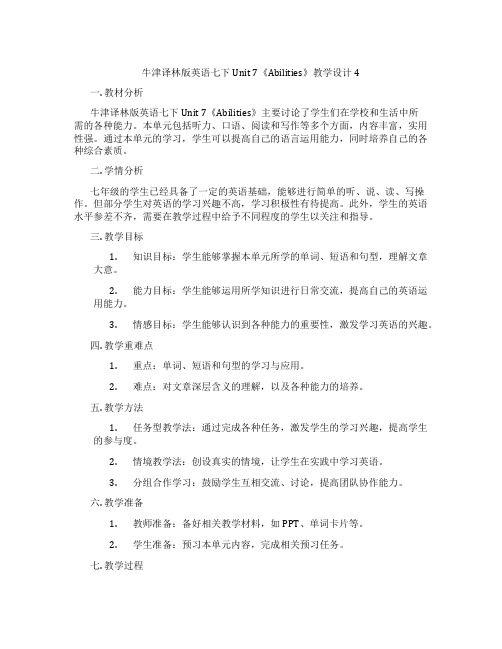
牛津译林版英语七下Unit 7《Abilities》教学设计4一. 教材分析牛津译林版英语七下Unit 7《Abilities》主要讨论了学生们在学校和生活中所需的各种能力。
本单元包括听力、口语、阅读和写作等多个方面,内容丰富,实用性强。
通过本单元的学习,学生可以提高自己的语言运用能力,同时培养自己的各种综合素质。
二. 学情分析七年级的学生已经具备了一定的英语基础,能够进行简单的听、说、读、写操作。
但部分学生对英语的学习兴趣不高,学习积极性有待提高。
此外,学生的英语水平参差不齐,需要在教学过程中给予不同程度的学生以关注和指导。
三. 教学目标1.知识目标:学生能够掌握本单元所学的单词、短语和句型,理解文章大意。
2.能力目标:学生能够运用所学知识进行日常交流,提高自己的英语运用能力。
3.情感目标:学生能够认识到各种能力的重要性,激发学习英语的兴趣。
四. 教学重难点1.重点:单词、短语和句型的学习与应用。
2.难点:对文章深层含义的理解,以及各种能力的培养。
五. 教学方法1.任务型教学法:通过完成各种任务,激发学生的学习兴趣,提高学生的参与度。
2.情境教学法:创设真实的情境,让学生在实践中学习英语。
3.分组合作学习:鼓励学生互相交流、讨论,提高团队协作能力。
六. 教学准备1.教师准备:备好相关教学材料,如PPT、单词卡片等。
2.学生准备:预习本单元内容,完成相关预习任务。
七. 教学过程教师通过与学生交流,了解学生对各种能力的看法,引导学生思考本节课的主题。
2.呈现(10分钟)教师通过PPT展示本节课的主要单词、短语和句型,让学生初步感知文章内容。
3.操练(15分钟)教师学生进行口语练习,让学生运用所学知识进行日常交流。
期间,教师应及时给予反馈和指导。
4.巩固(10分钟)教师通过PPT或黑板,对所学内容进行总结,帮助学生巩固记忆。
同时,布置相关作业,让学生课后巩固所学。
5.拓展(10分钟)教师引导学生思考文章深层含义,讨论各种能力在现实生活中的应用。
牛津译林版英语七下Unit 7《Abilities》教学设计1
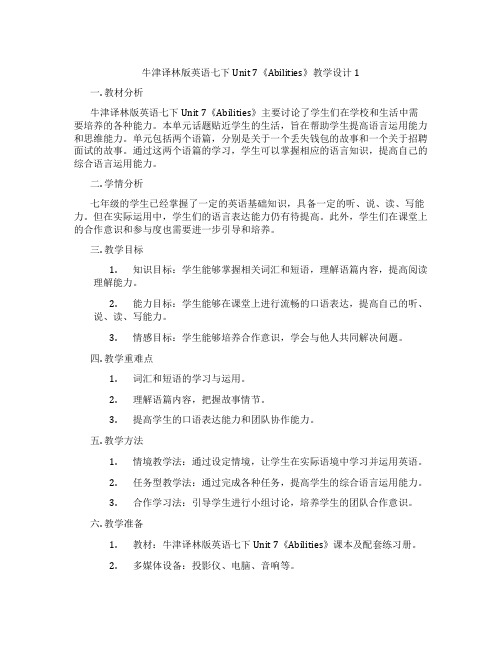
牛津译林版英语七下Unit 7《Abilities》教学设计1一. 教材分析牛津译林版英语七下Unit 7《Abilities》主要讨论了学生们在学校和生活中需要培养的各种能力。
本单元话题贴近学生的生活,旨在帮助学生提高语言运用能力和思维能力。
单元包括两个语篇,分别是关于一个丢失钱包的故事和一个关于招聘面试的故事。
通过这两个语篇的学习,学生可以掌握相应的语言知识,提高自己的综合语言运用能力。
二. 学情分析七年级的学生已经掌握了一定的英语基础知识,具备一定的听、说、读、写能力。
但在实际运用中,学生们的语言表达能力仍有待提高。
此外,学生们在课堂上的合作意识和参与度也需要进一步引导和培养。
三. 教学目标1.知识目标:学生能够掌握相关词汇和短语,理解语篇内容,提高阅读理解能力。
2.能力目标:学生能够在课堂上进行流畅的口语表达,提高自己的听、说、读、写能力。
3.情感目标:学生能够培养合作意识,学会与他人共同解决问题。
四. 教学重难点1.词汇和短语的学习与运用。
2.理解语篇内容,把握故事情节。
3.提高学生的口语表达能力和团队协作能力。
五. 教学方法1.情境教学法:通过设定情境,让学生在实际语境中学习并运用英语。
2.任务型教学法:通过完成各种任务,提高学生的综合语言运用能力。
3.合作学习法:引导学生进行小组讨论,培养学生的团队合作意识。
六. 教学准备1.教材:牛津译林版英语七下Unit 7《Abilities》课本及配套练习册。
2.多媒体设备:投影仪、电脑、音响等。
3.教学素材:相关图片、视频、音频等。
4.教学卡片:词汇和短语卡片。
七. 教学过程1.导入(5分钟)利用图片或视频引入丢失钱包和招聘面试的场景,激发学生的兴趣,引导学生思考与能力相关的问题。
2.呈现(10分钟)呈现丢失钱包的故事,让学生快速阅读并回答相关问题,了解故事大意。
然后呈现招聘面试的故事,引导学生关注故事中的能力和素质要求。
3.操练(15分钟)根据故事内容,设计各种口语练习,让学生模仿和表演。
牛津译林版英语七下Unit 7《Abilities》(Grammar)教学设计2
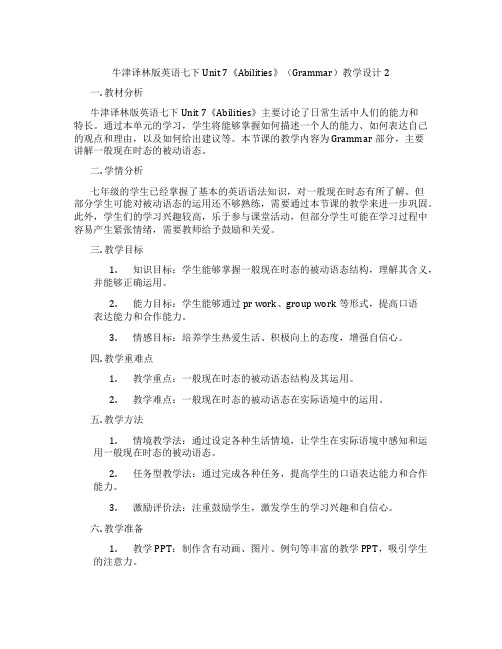
牛津译林版英语七下Unit 7《Abilities》(Grammar)教学设计2一. 教材分析牛津译林版英语七下Unit 7《Abilities》主要讨论了日常生活中人们的能力和特长。
通过本单元的学习,学生将能够掌握如何描述一个人的能力、如何表达自己的观点和理由,以及如何给出建议等。
本节课的教学内容为Grammar部分,主要讲解一般现在时态的被动语态。
二. 学情分析七年级的学生已经掌握了基本的英语语法知识,对一般现在时态有所了解。
但部分学生可能对被动语态的运用还不够熟练,需要通过本节课的教学来进一步巩固。
此外,学生们的学习兴趣较高,乐于参与课堂活动,但部分学生可能在学习过程中容易产生紧张情绪,需要教师给予鼓励和关爱。
三. 教学目标1.知识目标:学生能够掌握一般现在时态的被动语态结构,理解其含义,并能够正确运用。
2.能力目标:学生能够通过pr work、group work等形式,提高口语表达能力和合作能力。
3.情感目标:培养学生热爱生活、积极向上的态度,增强自信心。
四. 教学重难点1.教学重点:一般现在时态的被动语态结构及其运用。
2.教学难点:一般现在时态的被动语态在实际语境中的运用。
五. 教学方法1.情境教学法:通过设定各种生活情境,让学生在实际语境中感知和运用一般现在时态的被动语态。
2.任务型教学法:通过完成各种任务,提高学生的口语表达能力和合作能力。
3.激励评价法:注重鼓励学生,激发学生的学习兴趣和自信心。
六. 教学准备1.教学PPT:制作含有动画、图片、例句等丰富的教学PPT,吸引学生的注意力。
2.练习题:准备一些关于一般现在时态被动语态的练习题,用于课堂巩固和课后作业。
3.教学道具:准备一些代表不同能力的物品,如篮球、足球等,用于情境教学。
七. 教学过程1.导入(5分钟)教师通过提问方式引导学生回顾一般现在时态的相关知识,如一般现在时的构成、用法等。
然后引入本节课的主题——一般现在时态的被动语态。
牛津译林版七年级下全册单元英语教案七下Unit7教案(表格式)

4. Which place is it? What are the children doing now? Have you ever done something good like this? 5. What are the students doing from the pictures? How much did you donate to the Project Hope this term? Is it better to give than to receive? Why? 6. Where are Daniel and his friends? What are they doing? Do you often leave rubbish everywhere? Is it our duty to protect our environment? Read and understand the sentences. Step 5 Make a survey Fill in the table about what you have done in your daily life at school to see if you are a polite and helpful boy/girl? If not, what should you do next? 1. Can you Say hello to teachers when you meet them? 2. Can you clean the classroom carefully when you are on duty? 3. Can you pick up the rubbish in the classroom or around the campus? 4. Can you help your classmate with their homework? 5. Can you help stand in line at dinner time? 6. Can you give the thing back to the person who lost it? 7. Can you do something good to your teachers? 8. Can you look after the things in our classroom? 9. Can you take care of your classmate who is ill? 10. Can you keep our classroom clean and tidy? Step 6 Consolidation---an investigation To see how many are good enough and how many should improve their behavior. Group work: What can /can’ you do in public? Then ask the group leader to have a report.
【牛津译林版】中考英语一轮复习教案:7下 Unit 7 Abilities
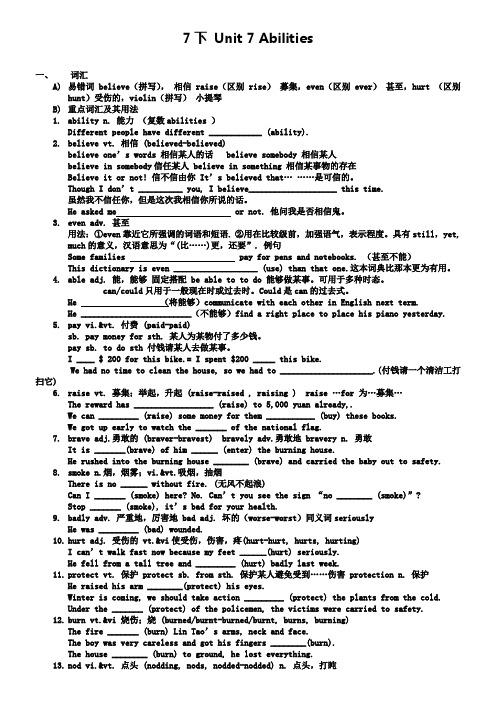
7下Unit 7 Abilities一、词汇A)易错词 believe(拼写),相信 raise(区别rise)募集,even(区别ever)甚至,hurt (区别hunt)受伤的,violin(拼写)小提琴B)重点词汇及其用法1.ability n. 能力(复数abilities )Different people have different ____________ (ability).2.believe vt. 相信 (believed-believed)believe one’s words 相信某人的话 believe somebody 相信某人believe in somebody信任某人 believe in something 相信某事物的存在Believe it or not! 信不信由你It’s believed that… ……是可信的。
Though I don’t __________ you, I believe____________________ this time.虽然我不信任你,但是这次我相信你所说的话。
He asked me or not. 他问我是否相信鬼。
3.even adv. 甚至用法:①even靠近它所强调的词语和短语. ②用在比较级前,加强语气,表示程度。
具有still,yet, much的意义,汉语意思为“(比……)更,还要”. 例句Some families pay for pens and notebooks. (甚至不能)This dictionary is even ___________________ (use) than that one.这本词典比那本更为有用。
4.able adj. 能,能够固定搭配 be able to to do 能够做某事。
可用于多种时态。
can/could只用于一般现在时或过去时。
Could是can的过去式。
牛津译林版七年级下册Unit 7《Abilities》word复习学案

7 Abilities【复习目标】1.复习unit7里的重要单词、短语与句型。
2.会用单词的正确形式以及恰当地使用本单元短语、重要短语去进行写作。
3. 能运用常用表达谈论个人能力。
【复习重难点】1.能够正确使用感叹句。
2.会写一封推荐信。
【复习内容】A、根据汉语,填写单词。
能力湿的;未干的;有雨的文章相信毯子粗心的信不信由你消防员尽某人最大努力留神,当心扑灭钢琴座位烧伤;烧……做得好发送;邮寄住院较好,更好甚至时刻;片刻,瞬间小提琴能,能够点头在……岁时付费仔细的,认真的;小心的教,演示;奖金为。
付款使受伤,伤害;疼先生笔记本记者女士,夫人募集新闻,消息推荐勇敢的报纸奖,奖品,资金救,救助火柴部分从……中救出……垃圾,废弃物参加烟,烟雾垃圾箱(食物、钱等的)短缺,缺乏____________ 在隔壁吸(烟),抽(烟)严重的,厉害的顺便问一下,顺便说说迷失;丢失受伤的照相机迷路可以,能,会没问题到……为止;在……之前倾倒 X光,X射线收到……的来信保护学期(用于书信结尾签名前)您忠实的冲,奔努力地,费力地B、重点短语1、收到某人的来信2、信不信由你3、当心,小心4、种树5、在公交车上给人让座6、为希望工程收集东西7、清理公园8、参观老年公寓9、最需要某物10、把某物寄/送给某人211、能做某事12、付款13、某人为某物付款给某人钱14、为某人募集资金15、获得一个奖16、从火灾中挽救邻居17、独自一人在家18、听到有人大声叫喊19、迷路220、跑到外面21、看到许多烟从隔壁冒出来22、一个8岁的男孩23、伤得严重24、快速跑到孙夫人的浴室25、把水倒到他的衣服上来保护他自己26、需要帮助的儿童27、冲进厨房28、浓烟29、用湿毛毯裹在孙夫人身上30、帮助她出来31、扑灭火 232、烧伤了某人的胳膊33、住院两周34、就在那时35、有时间思考某事36、参加(活动)37、计划好每件事38、仔细考虑39、.阻止某人做某事40、为俱乐部做大多数电脑工作41、在(做)某事方面做得更好42、叫救命43、在6岁时44、着火了45、变得更好46、当心烟花47、玩火柴48、在……方面努力训练49、弹钢琴/拉小提琴50、使某人远离某物51、进入校队52、在你的手机上拨个电话53、把某物落在家54 顺便说一下55、随身携带你的相机56、没问题57、透过墙壁看到东西58、就像x光线59、听到远处的东西60、用他的手拦停火车61、飞得像光速一样快62、用眼睛烧东西63、需要多读,多说64、努力学习地理65、写出好文章66、尽力(做某事)67、开始做某事68、推荐某人获得某物69、推荐某人做某事C、翻译重要句子:1、推荐丹尼尔获得今年的新星奖2、他是个多么勇敢的年轻人呀!3、这个年轻人多么勇敢啊!4、它是多么美妙的音乐!5、音乐多么美妙啊!6、别把热东西放入垃圾箱7、昨天我收到爷爷的来信。
牛津译林版英语七年级下册Unit7 单元教案
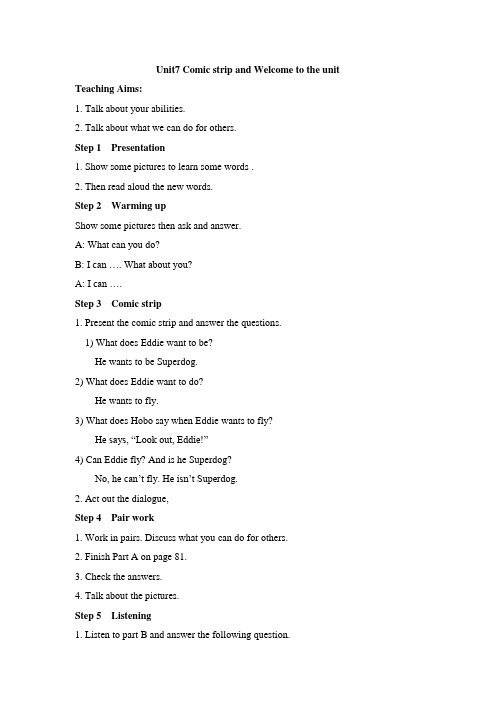
Unit7 Comic strip and Welcome to the unit Teaching Aims:1. Talk about your abilities.2. Talk about what we can do for others.Step 1 Presentation1. Show some pictures to learn some words .2. Then read aloud the new words.Step 2 Warming upShow some pictures then ask and answer.A: What can you do?B: I can …. What about you?A: I can ….Step 3 Comic strip1. Present the comic strip and answer the questions.1) What does Eddie want to be?He wants to be Superdog.2) What does Eddie want to do?He wants to fly.3) What does Hobo say when Eddie wants to fly?He says, “Look out, Eddie!”4) Can Eddie fly? And is he Superdog?No, he can’t fly. He isn’t Superdog.2. Act out the dialogue,Step 4 Pair work1. Work in pairs. Discuss what you can do for others.2. Finish Part A on page 81.3. Check the answers.4. Talk about the pictures.Step 5 Listening1. Listen to part B and answer the following question.1) Who’ll they help?2) What’ll they do for the children?2. Pair work.Suppose you’re members of the Helping Hands Club. Who are you going to help? What can you do to help them?Step 6 ExercisesHomework1. Remember the new words and phrases in this lesson.2. Recite the Comic strip.3. Write a passage to introduce “the Helping Hands Club”.ReadingTeaching Aims:1. According the pictures, keywords and context, speculate the main ideas.2. Describe fire.3. Practise reading skills by learning “A brave young man”.Step 1 Presentation1. Talk about the usage of fire.2. Present the new words with pictures and read them aloud.3. Finish Part B1. Match the words on the left with the meanings on the right.Step 2 Reading1. Listen to the text and answer the questions:1) Who’s the brave young man?2) What did the young man do?2. Scan the story, try to tell T/ F.1). Lin Tao helped his grandma out of a fire.2). Mrs Sun could not get out because her left leg was badly hurt.3). Mrs Sun was in her bedroom at that time.4). The fire only burnt Lin Tao’s arms.5). Lin Tao was in hospital for two months.6). Lin Tao thought everyone should be careful with fire.3. Read the text and answer the question.1) Did Lin Tao go out on 10 May?2) Was there a lot of smoke?3) How did Lin Tao protect himself?4) Did the fire burn Lin Tao?5) Was Lin Tao afraid at that moment?Step 3 Practice1. Finish Part B2.2. Finish Part B3.Step 4 SummarySum up the text.Step 5 Discussion1. Finish Part C: How to be careful with fire.2. Present the pictures and rules about fire safety.Step6 Homework1. Read aloud the article and underline the difficult parts.2. Remember the new words and phrases in this lesson.Integrated skills Teaching Aims:1. Practise listening skills by listening to a text.2. Learn how to talk about abilities.Step 1 Revision汉译英。
牛津译林版英语七下Unit 7《Abilities》教学设计2

牛津译林版英语七下Unit 7《Abilities》教学设计2一. 教材分析牛津译林版英语七下Unit 7《Abilities》主要讨论了人们在日常生活中所需的各种能力,如学习、工作、娱乐等。
通过本单元的学习,学生能够掌握有关能力的基本词汇和表达方式,学会如何询问和描述一个人的能力。
本单元包括三个课时,主要内容如下:1.单词和短语的学习:如 ability, skill, talent, weak, strong 等。
2.对话练习:学会如何询问和描述一个人的能力。
3.语法点:一般现在时的运用。
二. 学情分析七年级的学生已经掌握了一定的英语基础知识,具备一定的听说读写能力。
但学生在语言运用方面,特别是在口语表达和语法运用上仍有待提高。
此外,学生对自我认知和他人认知的能力有待加强。
三. 教学目标1.知识目标:学生能够掌握本单元的单词、短语和句型,了解一般现在时的运用。
2.能力目标:学生能够用英语询问和描述一个人的能力,提高自我认知和他人认知的能力。
3.情感目标:培养学生热爱学习、自信自强的精神风貌。
四. 教学重难点1.重点:单词、短语和句型的学习与运用。
2.难点:一般现在时的运用和口语表达。
五. 教学方法1.任务型教学法:通过设定各种实际情境,让学生在完成任务的过程中运用英语。
2.情境教学法:创设各种生活情境,激发学生的学习兴趣。
3.合作学习法:鼓励学生分组讨论,提高团队协作能力。
六. 教学准备1.教材:牛津译林版英语七下Unit 7《Abilities》课本、练习册。
2.课件:利用多媒体课件辅助教学。
3.教学资源:图片、视频等。
七. 教学过程1.导入(5分钟)利用图片或视频引入本课主题,激发学生的学习兴趣。
教师简要介绍本课内容,引导学生关注能力的重要性。
2.呈现(10分钟)教师展示本课的生词和短语,引导学生跟读并理解其含义。
通过举例说明,让学生学会如何用英语询问和描述一个人的能力。
3.操练(15分钟)学生分组进行角色扮演,模拟生活中询问和描述能力的场景。
牛津译林版英语七下Unit 7《Abilities》教学设计5
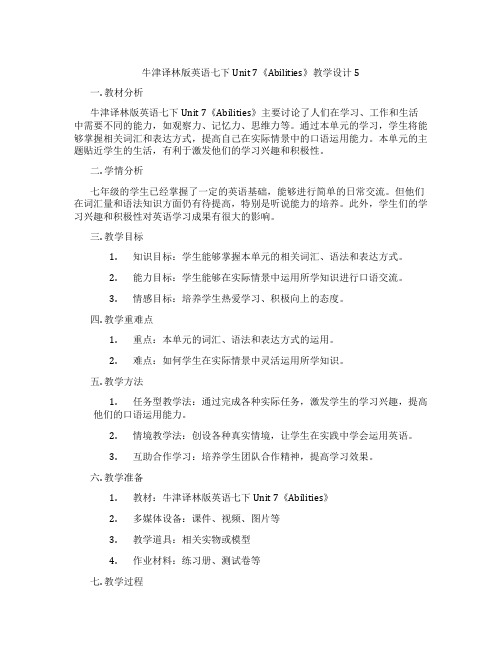
牛津译林版英语七下Unit 7《Abilities》教学设计5一. 教材分析牛津译林版英语七下Unit 7《Abilities》主要讨论了人们在学习、工作和生活中需要不同的能力,如观察力、记忆力、思维力等。
通过本单元的学习,学生将能够掌握相关词汇和表达方式,提高自己在实际情景中的口语运用能力。
本单元的主题贴近学生的生活,有利于激发他们的学习兴趣和积极性。
二. 学情分析七年级的学生已经掌握了一定的英语基础,能够进行简单的日常交流。
但他们在词汇量和语法知识方面仍有待提高,特别是听说能力的培养。
此外,学生们的学习兴趣和积极性对英语学习成果有很大的影响。
三. 教学目标1.知识目标:学生能够掌握本单元的相关词汇、语法和表达方式。
2.能力目标:学生能够在实际情景中运用所学知识进行口语交流。
3.情感目标:培养学生热爱学习、积极向上的态度。
四. 教学重难点1.重点:本单元的词汇、语法和表达方式的运用。
2.难点:如何学生在实际情景中灵活运用所学知识。
五. 教学方法1.任务型教学法:通过完成各种实际任务,激发学生的学习兴趣,提高他们的口语运用能力。
2.情境教学法:创设各种真实情境,让学生在实践中学会运用英语。
3.互助合作学习:培养学生团队合作精神,提高学习效果。
六. 教学准备1.教材:牛津译林版英语七下Unit 7《Abilities》2.多媒体设备:课件、视频、图片等3.教学道具:相关实物或模型4.作业材料:练习册、测试卷等七. 教学过程1.导入(5分钟)利用图片或视频引入本课主题,激发学生的学习兴趣。
如展示各种能力比赛的照片或视频,引导学生谈论各自的能力。
2.呈现(10分钟)讲解本课的主要词汇、语法和表达方式。
通过示例和讲解,让学生初步掌握相关知识。
3.操练(10分钟)设计各种口语练习,让学生在实际情境中运用所学知识。
如模拟招聘面试、角色扮演等,让学生积极参与,提高口语表达能力。
4.巩固(10分钟)通过完成任务或练习,检查学生对所学知识的掌握程度。
牛津译林版七年级英语下册Unit7Task教学设计

师:I appreciate your hard work and active participation today. Remember to pay attention to...
3.鼓励学生在课后继续思考和练习,为下一节课的学习做好准备。
2.学会运用一般将来时描述未来的职业规划和梦想,如:“I will be a teacher in the future.”、“My ambition is to become a scientist and make a difference in the world.”。
3.能够运用目标语言进行小组讨论,分享自己的职业理想,并倾听他人的意见。
(3)课堂活动:组织学生进行小组讨论,让他们分享自己的未来职业规划,并倾听他人的意见。在此过程中,教师关注每个学生的参与情况,给予适当的指导。
(4)巩固拓展:设计相关写作任务,让学生运用所学知识撰写一篇关于自己未来职业规划的短文,提高他们的写作能力。
(5)总结反馈:课堂结束时,教师对学生的表现进行评价和总结,指出他们的优点和需要改进的地方,激发学生的学习动力。
1.利用多媒体展示一组不同职业的图片,如医生、教师、科学家、工程师等,让学生观察并思考这些职业的特点和自己的喜好。
师:Look at these pictures. What jobs do you think these people are doing? Can you guess their characteristics and the qualities they need to have?
2.利用多媒体教学资源,如图片、视频等,激发学生的学习兴趣,帮助他们更好地理解和记忆词汇。
最新牛津译林版七年级下册unit 7《abilities》task教案.doc
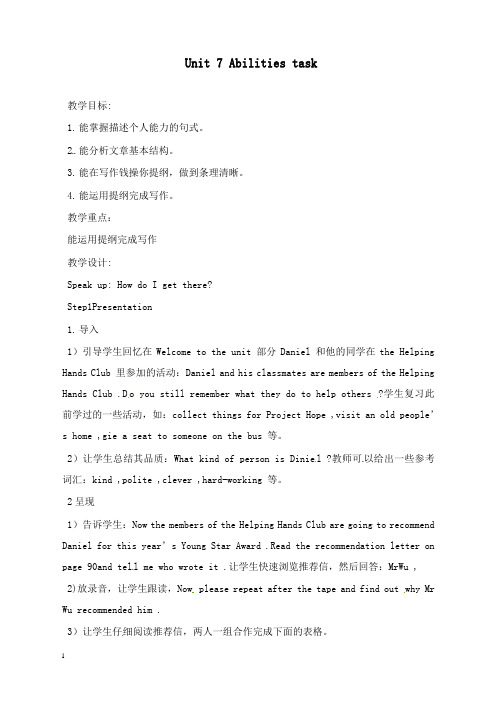
Unit 7 Abilities task教学目标:1. 能掌握描述个人能力的句式。
2. 能分析文章基本结构。
3. 能在写作钱操你提纲,做到条理清晰。
4. 能运用提纲完成写作。
教学重点:能运用提纲完成写作教学设计:Speak up: How do I get there?Step1Presentation1. 导入1)引导学生回忆在Welcome to the unit 部分Daniel 和他的同学在the Helping Hands Club 里参加的活动:Daniel and his classmates are members of the Helping Hands Club .D o you still remember what they do to help others ?学生复习此前学过的一些活动,如:collect things for Project Hope ,visit an old people’s home ,gie a seat to someone on the bus 等。
2)让学生总结其品质:What kind of person is Dinie l ?教师可以给出一些参考词汇:kind ,polite ,clever ,hard-working 等。
2呈现1)告诉学生:Now the members of the Helping Hands Club are going to recommend Daniel for this year’s Young Star Award .Read the recommendation letter on page 90and tell me who wrote it .让学生快速浏览推荐信,然后回答:MrWu , 2)放录音,让学生跟读,Now please repeat after the tape and find out why Mr Wu recommended him .3)让学生仔细阅读推荐信,两人一组合作完成下面的表格。
- 1、下载文档前请自行甄别文档内容的完整性,平台不提供额外的编辑、内容补充、找答案等附加服务。
- 2、"仅部分预览"的文档,不可在线预览部分如存在完整性等问题,可反馈申请退款(可完整预览的文档不适用该条件!)。
- 3、如文档侵犯您的权益,请联系客服反馈,我们会尽快为您处理(人工客服工作时间:9:00-18:30)。
牛津英语7年级下Unit7复习教学案一、词组、句子默写1、收到某人的来信2、信不信由你3、当心,小心4、种树5、在公交车上给人让座6、为希望工程收集东西7、清理公园8、参观老年公寓9、最需要某物10、把某物寄/送给某人11、能做某事12、付款13、某人为某物付款给某人钱14、为某人募集资金15、获得一个奖16、从火灾中挽救邻居17、独自一人在家18、听到有人大声叫喊19、迷路20、跑到外面21、看到许多烟从隔壁冒出来22、一个8岁的男孩二、语法训练(一)、情态动词练习根据句意,用can或could(can’t/ couldn’t)的适当形式填空1. I don't believe that she __________be a good English teacher when she was young2. The swimming pool doesn’t open today. We _________go swimming.3. _________the baby walk now? Yes ,she _________4. Look! The lights of Mr Li’s office are on. He ________be in the playground now.5. Jim ________ride a bick when he was five years old. It’s amazing6. If it rains tomorrow , we ________hold the sports meeting.7. That zoo opens today. We _______visit the animals there.8. In the past I _______speak English , but now I _______(二).单项选择( )1.______she ride a bike when she was 8 years old ?A.CanB.CouldC. NeedD.May( )2. Excuse me , ____you show me the way to the station?A.mustB.couldC.shallD.need( )puters___work out difficult maths problems very quickly.A.canB.needC.mustD.should( )4.______I come in , Mr Wu? Come in , please. You must come here earlier next time.A.ShallB.NeedC.Must Dmay( )5.Can you speak Japanese? No, I ________A.mustn’tB.can’tC.needn;tD.May not( ) 6.May I borrow your new computer next week? Sorry,you_______A.won’tB.may notC.can’tD.didn;t( ) 7.Could you get a glass of water for me ? __________A.Good ideaB.You’re welcomeC.That’s all rightD.No problem( ) 8.Must I still stay here now?______A .Yes,you do B.No, you may not C.No,you needn;t D.Yes, you are( )9._______interesting story it is!A.what B. what a C.what an D. how ( )10._______we have today!A.How fine a weather B.How fine weatherC.What a fine weatherD.What fine weather( )11.._______beautiful the dresses are!A.WhatB.What aC.HowD.How a( )12..______good time he had in the zoo yesterday !A.WhatB.What aC.What wasD.How( )13._____hard all these students are studying!A.WhatB.HowC.What aD.How a( )14.._____great fun it is!A.What B.What a C.How D.How a( )15._______interesting news!A baby panda is only 100 grams when it was born。
A.What B.How a C.What a D.How( )16._______beautiful pictures!A.What a B.How a C.What D.How( )17.Write _______and try to get 100 pointsA.as careful as possibleB.as careful as you canC.most carefulD.more careful( )18.My bike is broken .So I ______walk to school.A.mustB. canC.mayD.have to三、词汇练习1. We all know the best time to p_____ ______ trees is in spring.2. My job is to c_____________ things for Project Hope. Would you like to help me?3. Some children in poor areas don’t have money to go to school, so Project Hope helps p_____ for their education.(教育)4. It’s kind of you to give your s______ to others on a bus.5. Eddie is a ______ ______(超级狗).6. He is a true friend. I _________(相信) what he said.7. They are talking about different ways of _____ ___(raise) money.8. How cool! That college student is __ ____(unable) to speak four kinds of languages.9. People have different _____ _____ (ability).10. Today is cold. It is _____ __(甚至) colder.11. You need to buy a _____ ___(笔记本) to write them down.12. When ar you going to ___ ____(寄) these letters.13. How b____ ____ the boy is! She saved an old woman from the fire.14. I p_____ ___ some water over my jacket to keep myself safe.15.What a beautiful ___________(毯子)!16.We should do something to ______ ___(保护) our environment(环境).17.Alice fell off the bike yesterday, but luckily she was not badly _____ __ (受伤)18.That man ___ ______(冲进) into the building quickly and saved the child.19.---What’s wrong with you? ---The fire _______ ___ (烧伤) my arm.20.At last, the _____ ___(消防员) arrived and put out the fire.21.Don’t ________here, please. Can’t you see the sign “No ___________” (抽烟)?22.A doctor’s job is to s_______ people’s lives.23.Be ____ ____. You should do everything ____ ____.(careful)24.Zhang Hua put out the fire __________(quick).25.His clothes were all _____ __(湿的) when he came into the room.26.He ___ ____(nod) his head and said hello to me when I went out.27. My parents are _______ __(记者).28. Don’t (抽烟) here , please .29. Jack fell (跌倒) off the ladder and (hurt) himself .30. It’s dangerous to play with _______(火柴).31. The fire (burn) the house.32. When I told him to go home, he n_____ __ and went away.33. The firemen rushed into the house to (救) that little baby .34. You should put the rubbish into the ______ ___(垃圾箱).35. I read the news about Lin Tao in the ______ __(报纸).36. She is (倒) hot water into the thermos .(热水瓶)37. Thank you for (join) us this evening.38. Thomas brought the boy to (安全) .39. Is the fire still b_____ _____?40. Did you hear the n____ ____ about Lin Tao?41. She is doing her b______ ___ to learn English.42. Who teaches you English next t____ ___.43. He is very c___ ____, and often makes some mistakes in his homework.44.This ___ _____(文章) isn’t easy. I can’t read it.45. Jane plays the ____ ____(钢琴)very well.46. This photo s______ _ that he lives in London.47. Millie started to play the _______ _(小提琴) when she was six years old.48. You can have driving lessons at the a____ __ of 16 in the USA.49. She will try her best to learn history ________ _(good) next year.50. Suzy is a top student. She works_____ ___(努力地) on all the subjects.51. I want to ___ ____(推荐) him as our monitor.52. Do you often take p______ _ in your school sports meeting?53. Last week my friend got an ___ __(奖) for his amazing talk.54. I will come to see you ___ _____(在…之前) supper.55. We should try our best to help people in n___ ___.56. You can ask the police for help if you l______ _ your way in a street.57. We look forward to _____ ___(hear) from you soon.四、单元测试一、单项选择:18( ) 1. Her mother heard her __________ the piano in the next room at ten last night.A. playedB. to playC. playingD. plays( )2. Jim’s sister is _________.A.eight years oldB. an eight years old girlC. an eight year old girlD. an eight—years –old girl( )3. He can’t work out this maths problem because he is very _____ Maths.A. good atB. good forC. bad forD. weak at( )4. It’s difficult ______ us ________ English well.A. of , to learnB. for , to learnC. of , learningD. for , learning( ) 5. --- I can’t dance very well ----- __________. I can teach you.A. That’s goodB. That’s greatC. No problemD. That’s OK.( )6. Su Ning plays_________ and__________ very well.A. the basketball; the pianoB. basketball; pianoC. basketball; the pianoD. the basketball; piano( )7.When you cross the road, you should be __________ and walk __________.A. carefully, carefulB. careful, carefullyC. careful, carefulD. carefully, carefully( )8. Simon ________________ the football boots, so he can’t play with us today.A. forget to takeB. forgot to bringC. forgot to takeD. forgot taking( )9. Jack helped her neighbour _______ a big fire.A. outB. offC. out ofD. out for( )10. Daniel often _____ information ____ the Internet for the club .A. gives, toB. gets, fromC. gave, toD. got, from( )11. Xiao Ming_____________ the fire with water.A. put awayB. put onC. put outD. put into( )12.Did you do anything _________ yourself safe?A .to keepB .keepingC keepD kept( )13. Lei Feng always thought of __________ first.A. the othersB. othersC. the otherD. other( )14. The girls enjoyed____________ popular songs yesterday evening.A. to listen toB. listening toC. hearingD. hear( )15. Fire can happen if you __________ careful.A don’tB aren’tC wasD didn’t( )16.—Could I look at your photos? —Yes, of course you _______A. mayB. canC. willD. could( )17. My father hurt his leg and he was ________ for a month.A. in the hospitalB. in hospitalC. in a hospitalD. in an hospital( )18. I _________ my way in the evening when I was young.A. can lostB. could lostC. can loseD. could lose( )19 .There was a big fire last night, but the firemen _______.A. put down itB. put it downC. put out itD. put it out( )20.The children did _______best _______help the little girl.A.her;to B.their;to C.his;and D.their;and( )21._______is important _______careful with fire.A.That;be B.It;be C.It;to be D.That;being( )22.We’d like _________Nick _________the Best Student Award.A. to recommend;for B.to recommend:to C.recommending;for D.recommending;to ( )23.If we drive__________,we can be_________.A.slow;safe B.slow;safely C.slowly;safe D.slowly;safely( )24.—May I play with Jack,Mum? —________.He is a lazy boy.A.Yes,you may B.No.I can’t C.Yes,you do D.No,you mustn’t( )25. The old man ___________ six years ago.A. has diedB. was deadC. has been deadD. died( )26. His grandpa lives ____ in the countr y but she doesn’t feel_______.A. alone; aloneB. alone; lonelyC. lonely; aloneD. lonely; lonely( )27. ________ he told me!A. What bad newsB. How a bad newsC. How bad newsD. What a bad news( )28. Don’t smoke _________. It’s bad for your health.A. too manyB. too muchC. much tooD. many too( )29. --- Is the English book yours? --- No, it _________ Simon’s.A. canB. can beC. maybeD. might is( )30. She ate_____ the vegetables, it rained for a _______ day.A. whole, allB. all, allC. whole, wholeD. all, whole( )31.The young man felt very _______when he heard the bad news.A.unhappy B.happily C.happy D.unhappily( ) 32.一Can you teach me some English songs? 一_________ .A.No problem.B.You are welcome.C.Thank you.D.Why so ?( )33.If we __________ careful,fire can be dangerous。
